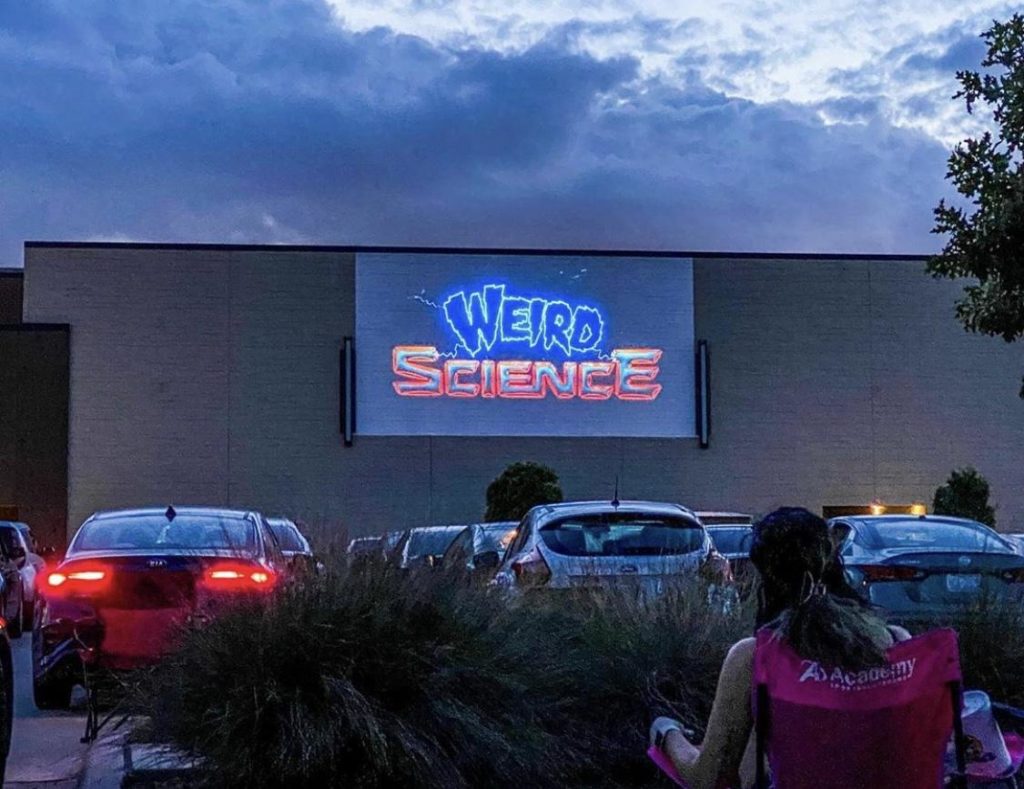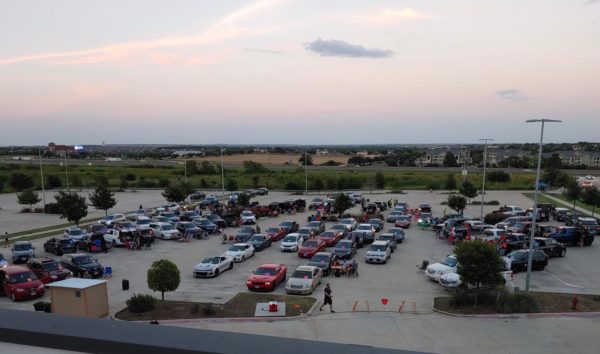By Jesse Rifkin & Chris Eggertsen
With indoor cinemas largely closed nationwide, drive-ins have attracted attendance numbers unseen in decades. Curated film series, with select titles playing over the course of multiple weekends, are attracting audiences itching to leave the house—but not their vehicle.
Rooftop Films
Rooftop Films’ outdoor film series opened with the documentary John Lewis: Good Trouble on a Friday night in July, as a timely tribute to this summer’s protests about race relations and police misconduct. But the film proved more timely than Rooftop organizers ever could have anticipated.
“The movie ended around 10:15, and we were breaking down the venue when the announcement went out,” Rooftop Films Artistic Director Dan Nuxoll remembers. Representative John Lewis had died during the screening.
New York City’s nonprofit Rooftop Films has held a summer series of independent releases —outdoors, without the drive-in component—since 1997. This year’s series had to abruptly switch plans in March with the arrival of Covid-19.
“Showing movies to people in cars has logistical challenges you wouldn’t even think about: sightlines, getting cars in and out of parking spots. None of us have geometric reasoning as one of our primary skills—we’re all liberal arts majors!” Nuxoll laughs. “I think we have one political science major. So we were stretching some muscles that might have been dormant since high school calculus.”
Several of the films, even titles chosen pre-pandemic, have taken on added resonance.
“Palm Springs [about a man and woman stuck in an infinite time loop] is eerily resonant, since my partner is the only person I’ve been able to hang out with for months,” Nuxoll says. “She Dies Tomorrow is a thriller about a group of people convinced of their imminent deaths, which feels both totally paranoid and yet of-the-moment and hyper-real.”
Currently, Rooftop Films’ Brooklyn Army Terminal pier location fits 85 cars, a capacity they’re moving to nearly double by adding a second screen. Their upcoming Queens location at the New York Hall of Science will fit about 150 to 200 cars. The series will feature talks, demonstrations, and pre-show experiences, such as science experiments before a screening of sci-fi classic 2001: A Space Odyssey.
Does holding a drive-in series in New York City, where less than half of households own a car, impact potential attendance?
“I don’t think anyone on Earth wants a world where the only way to watch a movie is at a drive-in,” Nuxoll admits. “But New York City isn’t granting public gathering permits for more than 25 people, so as of right now, it’s the only way to safely and legally hold a public event. We would certainly love to accommodate walk-up or bike-up attendees, but we’re not going to do anything in violation of city and state guidelines.”
Tribeca
“We were founded after 9/11, to bring communities together around film after a time of crisis,” Tribeca Film Festival director and vice president at Tribeca Enterprises Cara Cusumano says. “We felt that mission renewed this year.”
Cofounded by Robert De Niro in 2002, this year’s festival had originally been scheduled for April 15-26. Instead, they pivoted to a drive-in series\ in July and early August around the country, with a list of venues including parking lots of the Miami Dolphins’ Hard Rock Stadium, Dallas Cowboys’ AT&T Stadium, and the Los Angeles area’s Rose Bowl.
The capacity isn’t tens of thousands like those venues’ normal seating, with the Orchard Beach location fitting about 500 cars. In fact, depending on how you consider it, this drive-in format might not have been a pivot at all. “Tribeca Drive-In is something we’ve done since the first year in 2002. There were outdoor screenings, not necessarily in a car, but we called it a drive-in!” Cusumano laughs.
In light of recent protests about race relations and police misconduct, many of this year’s films —including Do the Right Thing, Black Panther, and Straight Outta Compton—have socially conscious themes. Other titles, including Goldfinger, Space Jam, Spy Kids, Girls Trip, The Fast and the Furious, Bridesmaids, Superbad, Meet the Parents, and The Wizard of Oz, were purely for fun.
For four straight days from July 9-12, the Rose Bowl venue also featured four live comedy shows, which were taped so they can be shown to larger audiences in the future. Dave Helem, Ester Steinberg, Daniel Webb, and Erica Rhodes each performed. “People watched from their cars, and we mic’ed up the cars so you can hear their laughter,” Cusumano explained.

EVO Entertainment’s Summer Drive-In Film Fest
At Texas exhibitor EVO Entertainment’s pop-up drive-ins, a brand-new item is on the menu: Celebrity autographs. Customers who turn out for the company’s ongoing Summer Drive-In Film Fest can now purchase signed merchandise and photo ops with Kelly LeBrock, Robert Patrick, and Anthony Michael Hall, the ‘80s teen icon who is serving as curator and host of the five-week series that will feature such classics as The Breakfast Club, Terminator 2: Judgment Day, and The Goonies.
The idea for the series came from EVO’s previous work with Hall, who participated in a Q&A of The Breakfast Club—in which he starred as Brian Johnson, a.k.a. “The Brain”—at the exhibitor’s Schertz location back in January. The successful event led Hall and EVO Entertainment CEO Mitch Roberts to discuss future partnerships. Then the pandemic hit, seemingly scrapping those plans—until, that is, EVO leaned into the drive-in model at its Schertz, Kyle, and San Marcos locations.
“He said, ‘Well, I think we gotta push this back,’” Roberts told Box Office Pro. “And I said, ‘Well, we’re doing this drive-in. Why don’t we do the event as a drive-in or even expand upon [that] and make it a drive-in film fest?’ He loved the idea, and it’s just kind of grown from there.”
Curated by Hall, the festival kicked off the weekend of July 17 and 18 with sold-out screenings of two of the actor’s best-loved early films: Sixteen Candles and Weird Science. For the latter title, he called on co-star LeBrock to appear in-person for a Q&A. After she signed on, word began to spread. “Once folks started seeing [that] we were adding other guests, more friends of [Anthony] or people that he’s worked with started reaching out to him,” says Roberts. “And now they’ve started to reach out to us directly.”
Initially focused on films featuring Hall, such as The Breakfast Club and National Lampoon’s Vacation, the festival has now expanded to accommodate additional celebrity guests, including Sean Astin (who will appear live via video for a double bill of Rudy and The Goonies) and Terminator 2 co-stars Robert Patrick, Edward Furlong, and Danny Cooksey, all of whom will take part in a post-screening Q&A for the 1991 action sequel. The added allure of these high-profile names has resulted in sellouts for the first three weekends of the festival, leading EVO to add a fifth weekend that will screen two of Hall’s films co-starring Robert Downey Jr.: the 1988 football comedy Johnny Be Good and Hall’s 1994 directorial debut Hail Caesar.
Aside from a couple of minor technical hiccups the first weekend, Roberts says the festival has been a rousing success, bringing fans back to EVO’s drive-in locations in droves following a drop-off in business. “As time went on, naturally people got sick of the experience, because they’ve experienced it,” says Roberts. “That’s why we had to turn around and adapt and create a new experience. I think that’s just the nature of the environment we’re in today.”
The success of the Summer Drive-In Film Fest has emboldened EVO to continue operating its drive-ins for the foreseeable future, and even potentially do more celebrity-fueled events going forward.
“This has been eye-opening,” says Roberts. He notes that EVO’s indoor operations—which are currently at 50% capacity—are only bringing in about 30-35% of last year’s business. “I think for us, it’s taking this and the footprint that we’ve developed for it, and just keep being creative to find fun things we can do, whether it’s with new talent, or maybe different areas of media or pop culture—just doing what we do and finding those experiences to provide to our community.”



Share this post